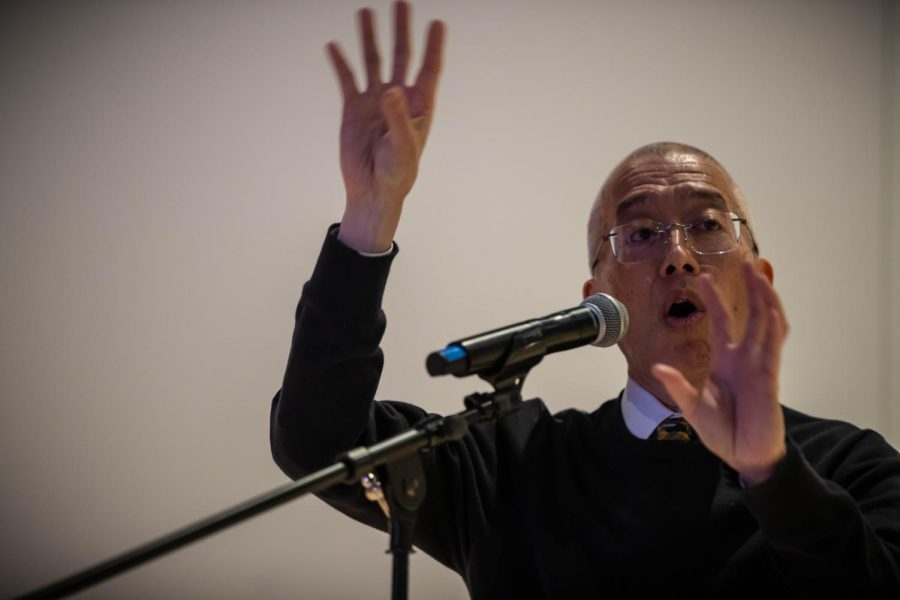Columbia administrators unveil Master Plan, reconfigure campus ‘hubs’
February 8, 2023
Columbia College presented its vision for a future campus that is more clearly defined in the South Loop and in which degree programs are reconfigured into five different “hubs,” with a new academic center at the center.
President Kwang-Wu Kim introduced the plan Feb. 7 at the Student Center, with Provost Marcella David, Chief Financial Officer Jerry Tarrer and representatives from design firm Gensler providing further details.
Kim emphasized in his opening remarks that the plan was “not fixed.”
“This presentation has been much delayed by Covid,” Kim said. “We decided that rather than do this as one of our infamous Covid Zoom meetings we would wait until the situation allowed us to do something live.”
The redesign, the most extensive parts to be paid for through a fundraising campaign, would centralize the campus in existing buildings and include new construction for a so-called “movement hub” for dance and theater at 11th and Wabash.
Through these projects, the college hopes to increase space for learning and socializing while decreasing unused office space.
The research that informed the plan began in 2019 and was done by the college in partnership with Gensler, which designed the Student Center. Kim said more than 500 stakeholders informed the plan’s development.
In their research, they found that less than 60% of the office spaces in eight of 14 analyzed buildings were occupied. The plan, as outlined this week, does not include the sale of any existing property.
The college defined 1312/1306 S. Michigan, 1014 S. Michigan, 916/1000 S. Wabash and 624 S. Michigan as being in “high need for intervention.” Buildings in need of “moderate intervention” were 1104 S. Wabash and 623 S. Wabash. Buildings with the lowest need were 1600 S. State 72 E. 11th, 619 S. Wabash, 618 St. Michigan 33 E. Ida B. Wells and 600 S. Michigan.
The plan is divided into two phases.
In the first stage of the plan, to be completed in the next one to five years, the college would mostly focus on streetscape and lobby improvements, what Provost and Tarrer described as “first impressions.” These would be paid for through budgeted capital expenditures.
The initiatives and buildings include:
- Campuswide streetscape enhancements
- 600 S. Michigan lobby improvements
- 618 S. Michigan 2nd Floor renovations and basement classrooms
- 618 S. Michigan Welcome Center
- 623 S. Wabash improvements
- 1600 S. State upgrades
- 1104 S. Wabash renovations
The next phase, described as “transformational impact,” is five to 11 years out. Fundraising efforts would support this phase, Tarrer said.
Columbia plans to establish five different hubs to create a “heart” of the urban campus as well as enhance street presence of the college. The hubs would be:
- Making Hub (623 S. Wabash)
- Media Hub (1104 S. Wabash)
- Sound Hub (33 E. Ida B Wells)
- Movement Hub (11th and Wabash)
- Repurposed Media Production Center (1600 S. State St.)
A new academic center, its location undecided, is also part of this phase, though details are sparse. Its purpose is to be a cross collaboration hub for faculty with additional:
- classrooms and labs
- collaborative and support space
- Faculty Hub
- Industry Hub
- new library
- meeting spaces
- flexible classrooms.
Money for the project would be raised through “multi-strand fundraising” that would include major gifts and a capital campaign, Kim said.
After the plan was presented, Student Government Association President Tyler Harding raised questions about the environmental sustainability. Eric Freedman, exiting dean of the School of Media Arts, asked if student housing would be addressed.
Hurst, a Gensler designer, said sustainability was “baked in” to the plan.
Eric Freedman, exiting dean of the School of Media Arts, asked if student housing would be addressed.
Tarrer said college leaders “recognized the need” to look into the dorms and are in early talks with Vice President of Student Affairs Sharon Wilson-Taylor.
As questions subsided, Kim returned to the microphone, acknowledging the concerns raised.
“We have to show the world that we have pride in ourselves and we actually understand we are a quality institution,” Kim said.








